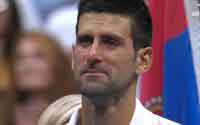Although Djokovic may have lost the 2021 US Open, what happened that day will leave a lasting memory in anyone who experienced it. Much like Bernie's loss in 2020.xxxxxxxxxxxxxxxxxxxxxxxxxxxxxxxxxxxxxxxxxxxxxxxxxxxxxxxxxxxxxxxxxxxxxxxxxxxxxxxxxxxxxxxxxxxxxxxxxxxxxxxxxxxxxxxxxxxxxxxxxxxxxxxxxxxxxxxxxxxxxxxxxxxxxxxxxxxxxxxxxxxxxxxxxxxxxxxxxxxxxxxxxxxxxxxxxxxxxxxxxxxxxxxxxxxxxxxxxxxxxxxxxxxxxxxxxxxxxxxxxxxxxxxxxxxxxxxxxxxxxxxxxxxxxxxxxxxxxxxxxxxxxxxxxxxxxxxxxxxx
What a US Open the world was fortunate to experience last year. Truly it was an amazing spectacle, on the one hand, but then, on the other, a surprisingly profound experience of global human solidarity that doesn't come around very often.
After battling through a match with the German Zverev that pushed tennis to its absolute extremes, to the point where it was the sport itself on display as perfection, it seemed impossible that anyone could prevent Djokovic from achieving his goal in the Calendar Grand Slam.
Unfortunately, that is not what happened. From the beginning of the final match against Medvedev, Djokovic was nervous, the weight of the historical moment clearly unsettling him. Double faults, missed forehands down the line. And yet, after a couple of matches lost, it seemed again that it was just necessary for him to be put on the backfoot in order to find his motivation. Noone thought it was over. And yet, something was different: there was an anxiety about 'what if he gets down against Medvedev and can't bring it back?' After all, the Russian was proving how treacherous his game was. If there was one opponent it seemed he would breeze through, as he had in the past, it was Medvedev. Now it suddenly seemed that Medvedev's game had found its most perfect context for expression as his long arms snatched balls out of thin air as if by magic and sent them ripping back beyond reach.
And so it was, that game after game, Djokovic fell further and further behind, the dream of the Calendar Grand Slam, taking the lead in number of Grand Slams vanishing before everyone's eyes.
Suddenly, as the reality that there was nowhere left for Djokovic to go began to dawn on everyone, a crowd that had never before gotten behind the Serb rose to its feet to cheer him on. Booing and roaring to disrupt Medvedev's serve, the crowd willed Djokovic on. And for a moment, it seemed to be working. Double fault on the serve. Deuce. Double fault. Advantage. Game Djokovic.
But it wouldn't be enough. No amount of cheering, screaming, and willing him on could prevent the inevitable. And so it was that there as he prepared to change sides for perhaps the final time that Djokovic covered his head in a towel and began to sob uncontrollably. It was incredibly emotional for everyone who was watching that day. Such a raw, human emotion. No pretense at all anymore. What one saw on that court was precisely what they felt in that moment as history was denied.
He lost that day. But standing there, eyes red from tears, he spoke to the crowd in New York, and thanked them for an experience that was more important to him than winning. He first dreamed during the NATO bombing of Serbia in the 90s, with his Wimbledon trophy made of 'improvised materials' (his own words), of a future when he would stand in front of the world holding the real thing. Now, he stood in front of the world that day as the ostensible loser of the match, preparing to accept his silver plate. But he understood what it meant that an American crowd that had for so long refused to acknowledge him had in fact just invested in him their desires to see history made. Whether or not it came down to his personality that Americans had rejected him for so long, or whether it was because in him they say a foil for perpetuating an anti-Serbian war politics, didn't matter anymore. Those ideological and categorical separations, at least for a moment, had vanished. And in that moment he realized then that he had already achieved his goal. That, through their desire to see history rendered explicit, the response of the fans in New York made it clear that because he was an acceptable vehicle for the making of such history, he must be that which he sought to validate. It had already been proved, even though he lost. And, through the raw, unscripted emotion, countless millions around the world also participated in that a-political, a-national purely human—historical—understanding.
Djokovic is more than an athlete, more than a living tennis legend: his is a philosopher of the sport whose always direct, confrontational, and precise voice cuts through the spectacle of commodified glamour to reveal the humanity at the center of such historical success. In today's world of money, fame and success, particularly in the world of sport, that it is still possible for sport to teach lessons about things other than money, fame, and success is profoundly important. Humanity needs more people like Djokovic to get out from where it is currently suffocating.
So maybe he doesn't need a Calendar Grand Slam in 2022 anymore. Maybe he has already achieved everything a person could ever hope for. For he, like Maradonna, has already been elevated beyond sport and into the global flux of humanity's striving. And we, through him, will forever remember in that day what it feels like when solidarity rises to its point of historical articulation.
There haven't been many such moments. But, like the day Bernie withdrew from the 2020 primary, and immediately after Nevada when he seemed to have won it, when they do arise, they make us aware of the vast unspoken sweep of history within which what we do do and say, is but only a tiny part. The truth of history defines its own temporality of becoming, whether we like it or not. And the moments in which it forces us to recognize our togetherness are, like the stars in the sky, waymarkers guiding us back together in the endlessly repeated process of eternal return.
